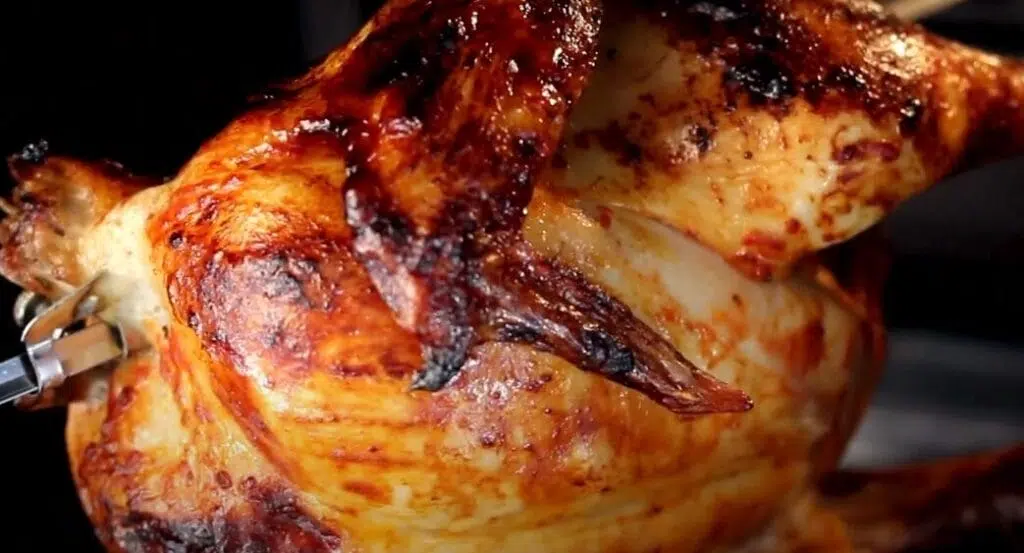Can Dogs Eat Rotisserie Chicken? Top 5 Myths Busted!
Rotisserie chicken might seem like a tasty treat for your dog, but it comes with risks. The high-fat content and seasonings, particularly garlic and onion, can be harmful, leading to serious digestive issues or toxicity. Furthermore, the cooked bones from chicken can splinter, posing choking hazards or causing internal blockages. If you choose to share this meal with your dog, make sure to remove all bones and serve only small, unseasoned portions. Always watch your dog closely after introducing new foods and consult your vet if any health concerns arise.
Can Dogs Eat Rotisserie Chicken?
This method helps avoid unhealthy fats and ensures a balanced diet for your pet. Offer this nutritious mix as part of your dog’s diet for a happy and healthy meal option.
To ensure your dog enjoys the benefits of rotisserie chicken safely:
- Remove skin and bones from the chicken to eliminate risks.
- Shred the chicken meat for easier consumption.
- Mix the shredded chicken with vegetables and grains such as peas, carrots, sweet potatoes, and brown rice.

Precautions Before You Give Your Dog Rotisserie Chicken
The preparation and seasoning of rotisserie chicken can present risks to dogs, as the skin is typically seasoned with spices that may be harmful. Furthermore, store-bought versions often contain flavor enhancers, preservatives, and elevated sodium levels, all of which could be detrimental to canine health.
Balanced Diet
While rotisserie chicken offers valuable protein for dogs, relying on it exclusively can lead to nutritional imbalances. A comprehensive diet, encompassing proteins, fats, carbohydrates, and essential vitamins and minerals, is crucial for maintaining a dog’s health.
Manufacturers consider variables such as age, breed, size, and health status to create tailored dog food formulas, ensuring a comprehensive and balanced diet for your pet’s daily nutritional needs.
Portion Control
Chicken serves as a nutritious protein source, yet moderation is key. Excessive consumption, particularly of skin and bones, may disrupt dietary balance, contribute to calorie surplus, and cause digestive complications.
Also read: My dog has parvo but is drinking water
Bone Safety
When offering your dog rotisserie chicken that contains bones, exercise caution to avoid sharp, splintering bones that may lead to injuries. Specifically, cooked bones are prone to brittleness and can present a risk of choking or gastrointestinal distress.
Remove the Skin
Rotisserie chicken skin, often marinated or seasoned, can contain substances like onion and garlic, which are toxic to dogs. It’s essential to remove the skin and wash the meat well to eliminate any leftover seasonings.

Seasonings and Additives
Exercise caution regarding seasonings, sauces, and additives in rotisserie chicken, as certain ingredients like onions and garlic are toxic to dogs. It’s best to avoid offering your dog chicken that is heavily seasoned or contains these harmful components.
Food Allergies
Keep an eye on your dog for indications of food allergies or sensitivities, noting that poultry, despite being a prevalent protein source, can sometimes trigger allergic reactions in dogs.
Consult with Your Veterinarian
Prior to altering your dog’s diet or introducing new food items, consulting with a veterinarian is recommended. They can offer tailored advice considering your dog’s unique nutritional requirements and health condition.
Also read: Can drug dogs smell nicotine
Is It Safe to Feed My Dog Rotisserie Chicken?
Chicken meat, once devoid of skin and bones, is a safe and nutritious option for dogs, providing a rich source of protein essential for muscle development and maintenance.
Store-Bought Chicken
Commercially available rotisserie chickens typically have elevated sodium and preservative content, which is unsuitable for dogs. Opt for cooking a simple, unseasoned chicken at home to safely satisfy your dog’s poultry cravings.
Healthy Ways to Add Chicken to Your Dog’s Diet
Cooked, unseasoned chicken
For a safe and healthy option, prepare a chicken from your local market at home, avoiding all seasonings. Dogs do not require salts or spices to appreciate their meals, ensuring this homemade option is devoid of harmful additives, unlike its store-bought counterparts.

Rotisserie chicken as a treat
As highlighted, when stripped of skin and bones, rotisserie chicken can serve as a beneficial protein source and a delightful treat for your dog. However, this implies feeding only a small portion of the chicken meat as a reward for positive behavior, not the entire rotisserie chicken.
Mixed with dry food
Incorporating chicken meat into your dog’s standard dry food can enhance meal appeal, proving especially beneficial for picky eaters or those with diminished appetites from aging or illness.
Chicken broth
Introducing homemade chicken broth into your dog’s diet offers a flavorful addition, provided it lacks onions, garlic, and excessive salt, all harmful to dogs. This broth can enhance dry food or be offered cool as a nutritious, refreshing snack.
Also read: Cytopoint killed my dog
Chicken and vegetable stew
Preparing a stew with chicken and canine-safe vegetables such as peas and carrots enriches your dog’s diet with not just protein but also essential vitamins and fiber from the vegetables, contributing to a well-rounded nutritional intake.
Chicken-based dog food
Numerous premium dog food brands feature chicken as the main protein source, ensuring a balanced diet that fulfills all of your dog’s nutritional requirements.
Conclusion
Dogs can enjoy rotisserie chicken as a treat, but it’s important to remove skin and bones and avoid harmful seasonings to maintain their nutritional balance. Regular consumption isn’t advised due to high sodium and fats, potentially leading to health issues like pancreatitis. Always consult a professional before making dietary changes. Rotisserie chicken should supplement, not replace, a balanced diet from specially formulated dog food, ensuring dogs receive essential nutrients while enjoying their meals.
FAQs
Is it OK to feed dogs roast chicken?
Cooked chicken, rich in protein, is generally safe and beneficial for dogs, often included in commercial dog diets. It can be served alone or mixed with regular canine meals for nutritional enhancement.

What if my dog eats a rotisserie chicken with bones?
Monitor your dog’s stool for bone fragments after ingestion and consult a vet if not observed within 72 hours or as advised, to ensure no blockages in the digestive tract.
Can dogs eat week-old rotisserie chicken?
Cooked chicken remains safe in the refrigerator for 3-4 days, but for canine consumption, aim to serve within 1-2 days for optimal freshness. Prior to feeding, inspect for any spoilage indicators such as off odors or textures.
Is Costco rotisserie chicken safe?
Precooked rotisserie chickens may still harbor germs, so ensuring safety involves reheating to an internal temperature of 165°F to eliminate any harmful bacteria before consumption.
Will rotisserie chicken upset my dog’s stomach?
The appealing taste of rotisserie chicken comes from its skin, enriched with butter, salt, and seasonings, which may disrupt a dog’s digestion. Additionally, chicken bones, although often digested by dogs, pose a risk of choking and should be avoided.
Can I feed my dog rotisserie chicken everyday
Feeding your dog rotisserie chicken daily is not recommended due to its high salt and seasoning content, which can lead to dietary imbalances and health issues. It’s best to incorporate it occasionally and in moderation as part of a balanced diet.
Is rotisserie chicken good for dogs with diarrhea
Rotisserie chicken, when served plain and without the skin, can be beneficial for dogs with diarrhea due to its blandness and high protein content. However, it should be used cautiously and as part of a veterinarian-approved dietary plan to ensure it aids in recovery.
Can dogs eat rotisserie chicken skin?
Dogs shouldn’t eat rotisserie chicken skin due to its high-fat content and seasonings, which can lead to digestive upset and contribute to unhealthy weight gain.







